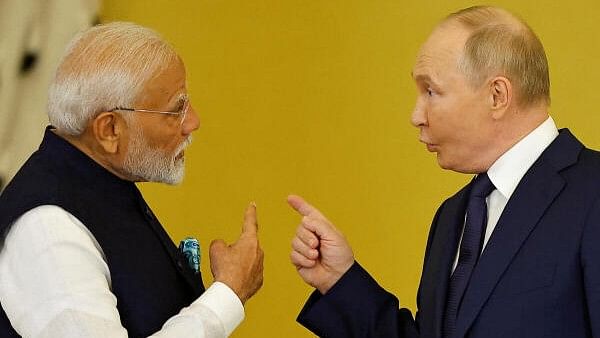
PM Narendra Modi and Vladimir Putin
Credit: Reuters Photo
New Delhi: Though Prime Minister Narendra Modi on Tuesday conveyed to President Vladimir Putin his willingness to help end the Russia-Ukraine conflict, the leader of the former Soviet Union nation stuck to his stand and harped on the destructive policy of President Volodymyr Zelenskyy’s government in Kyiv and its patrons in the West.
Modi shared with Putin over the phone the “insights” from his recent visit to Kyiv, where he met Zelenskyy and reiterated India’s call for resolution of the Russia-Ukraine conflict through dialogue and diplomacy and its willingness to contribute in all possible ways to facilitate an early return of peace.
The Prime Minister dialled the Russian President a day after receiving a call from United States President Joe Biden.
“(I) Spoke with President Putin today. (We) Discussed measures to further strengthen (the) Special and Privileged Strategic Partnership (between India and Russia),” Modi posted on X after his phone call with the Russian President. “(We) Exchanged perspectives on the Russia-Ukraine conflict and my insights from the recent visit to Ukraine. (I) Reiterated India’s firm commitment to support an early, abiding, and peaceful resolution of the conflict,” added the Prime Minister.
The Prime Minister underlined the importance of dialogue and diplomacy as well as sincere and practical engagement between all stakeholders to achieve an abiding and peaceful resolution of the conflict, according to a press release issued by the Ministry of External Affairs in New Delhi.
“Modi informed about his recent visit to Kyiv, emphasizing his interest in contributing to a possible political and diplomatic settlement of the situation around Ukraine,” the office of the Russian President stated in a press release issued in Moscow. “For his part, Vladimir Putin gave a fundamental assessment of the destructive line of the Kyiv authorities and their Western patrons, outlining key Russian approaches to ways to resolve the conflict.”
New Delhi had sent a senior diplomat to represent it at a peace summit held in Switzerland to end the Russia-Ukraine conflict in June but refrained from associating itself with a joint communiqué, which 80 nations had issued at the end of the conclave.
Russia and its key ally China had not attended the peace summit, which had been seen largely as a move by the West to drum up support for the 10-point peace formula proposed by Ukraine.
India had then argued that both Ukraine and Russia should be on the table for any peace initiative to succeed.
Modi reiterated New Delhi’s stand on the peace summit when he visited Kyiv last Friday and Zelenskyy told him that the joint communiqué adopted at the summit in Switzerland could serve as a basis for further efforts to promote just peace based on dialogue, diplomacy, and international law.
The Prime Minister in his reply to the Ukrainian President stressed the need for “sincere and practical engagement between all stakeholders to develop innovative solutions that would have broad acceptability and contribute towards the early restoration of peace”.
External Affairs Minister S Jaishankar elaborated on New Delhi’s view during a news conference in Kyiv on Friday. “Any exercise, if it has to be productive, will naturally have to involve the other party concerned,” he said, indicating that India believed that the process initiated at the Peace Summit in Switzerland would end the conflict in Ukraine only when Russia would join it.
Modi’s visit to Kyiv was significant as it came six weeks after he travelled to Moscow, where his hug with Putin prompted the Ukrainian President to express his disappointment on X. The United States too expressed disappointment over the “symbolism and timing” of the Prime Minister’s visit to Russia.
His visits to Moscow and Kyiv were an attempt by New Delhi to signal that it would continue to seek a strategic balance between India’s decades-long ties with Russia with its relations with the United States and the rest of the West.
